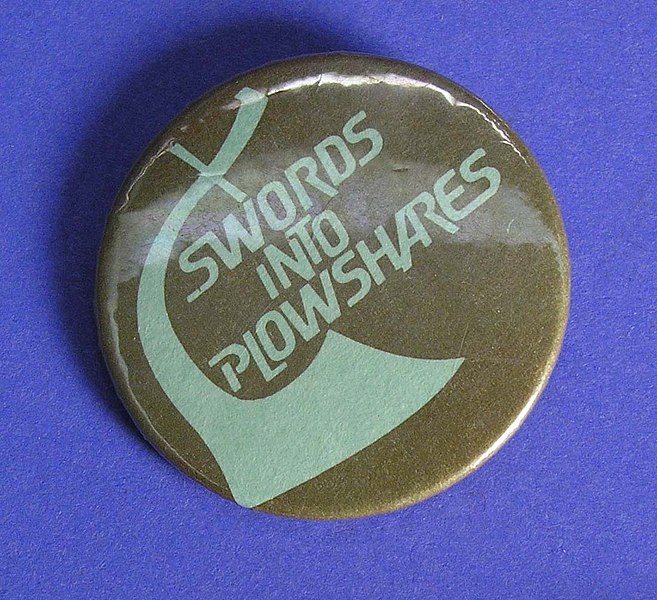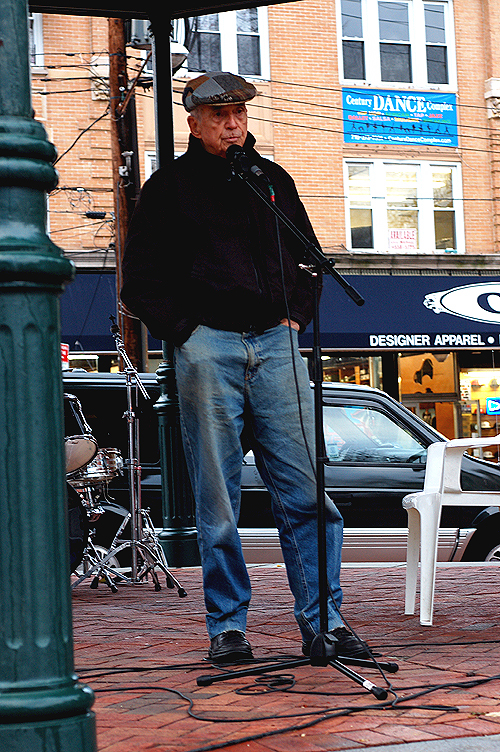
The Plowshares Movement originates from a protest action which took place in Pennsylvania in 1980, when eight activists, including a priest and a nun, entered a General Electrics plant where nuclear warheads were being manufactured; they damaged the warheads by beating them with hammers, and poured pints of their own blood on paperwork around the site. The activists had come from Jonah House, a left-wing Catholic community in Baltimore, which had developed out of the Catholic anti-draft movement of the Vietnam war. Several of the activists had themselves been involved in raids on draft offices, where they would render draft documents unusable by pouring blood on them. Their intention was partly practical – hammering on the delicate electronics of the warheads temporarily disabled them. More significant, however, was the symbolism of the action, recalling the prophecy recorded in the Book of Isaiah that ‘they shall beat their swords into plowshares, and their spears into pruning hooks; nation shall not lift up sword against nation, neither shall they learn war anymore.’ The protest constituted a specifically Christian witness to the intrinsic evil of nuclear weapons, with its roots in a Christian vision of peace. Simultaneously, the pouring of blood was intended to make visible and manifest the real violence and cost of the work being undertaken at the plant. The protestors were arrested, and given initial sentences of between 18 months and ten years; after a lengthy series of appeals, they were finally sentenced to time served, having spent slightly less than 18 months imprisoned.[1]

The actions of the Plowshares Eight, as they became known, were quickly imitated at other sites connected with nuclear arsenals in the USA and several European countries; the Plowshares Eight discovered with surprise that they had started a movement. Many of those undertaking Plowshares actions were connected with Jonah House or with communities of the Catholic Worker movement; in England, what is now the London Catholic Worker emerged from a Plowshares action in 2000. As of 2019, there had been about 101 Plowshares actions.[2]
While the website of Trident Ploughshares, the movement’s British branch, states that Plowshares ‘is no longer a Christian movement’, and many Plowshares activists have been of other faiths or of none, the movement remains closely linked with the tradition of the Catholic Left, both in practical terms and in terms of its distinct vision of peace. The central act of the beating of weapons into plowshares insists on the integrity of the protest actions with Christian tradition, and resonates with a distinctively Catholic understanding of sacramental public ritual. Furthermore, the persistence of the movement can only be understood within a context of what amounts to Christian metaphysics. The movement has been much influenced by the argument of Thomas Merton, a Trappist monk and supporter of the Catholic anti-war movement of the 1960s and 70s, that Christian witness against war does not rely on concrete results in order to be worthwhile. The movement has not ended NATO countries’ nuclear arsenals, but has tended to consider its actions the fulfilment of a Christian duty to act against evil and therefore a good in themselves. Art Laffin, a participant in several Plowshares actions, has said that the act ‘of beating the swords of our time into plowshares, are manifestations of an ethic of resurrection. They are rooted in the belief that the God of all Creation has the last word, not the principalities and powers. The God of Life has overcome the powers of this world and the forces of death!’[3] To an extent, then, Plowshares movements refer to a vision of peace and peace-building which has already been accomplished, insofar as they exist as individuals’ responses, within human history, to what they regard as the Gospel’s proclamation of a vision of Christian peace both within and outside of time.
What do you think?
- What kinds of peace and peace-building do Plowshares movements encourage others to pursue?
- How worthwhile are actions focussed on ‘witness’ in the absence of concrete results?
- How central do you think nuclear disarmament is to peace-building? Can a nation which relies on a nuclear deterrent be considered ‘peaceful’?
- What can we learn from the history of the Plowshares movement about the relationship between politics and faith in visualisations of peace / approaches to peace-building?
- How might your own ideas about peace be influenced by religious traditions you are familiar with?
If you enjoyed this entry in our museum…
You might also like The Ecumenical Peace Pilgrimage to South Sudan, Peace in Faith and Practice: mediation and disarmament, Little Gidding, Om Shanti, Oseh Shalom and Make me a Channel.
Thomas Frost, April 2023
References
[1] Sharon Erickson Nepstad, “Disruptive Action and the Prophetic Tradition: War Resistance in the Plowshares Movement”, U.S. Catholic Historian 27, no. 2 (2009): 105.
[2] Art Laffin, “A History of the Ploughshares Movement” (lecture, St. Athanasius Episcopal Church, Brunswick, GA., 22 October, 2019): https://kingsbayplowshares7.org/plowshares-history/.
[3] Ibid.